 Features
Features
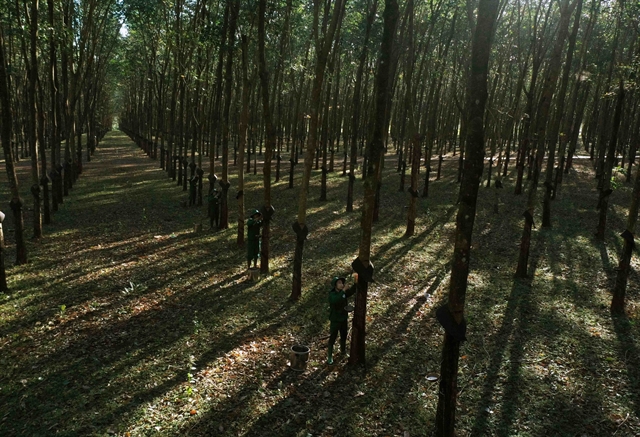
Several farms on the outskirts of Hà Nội now raise vegetables without chemicals, just as their ancestors did - and city people are flocking to them. Song Hương reports.
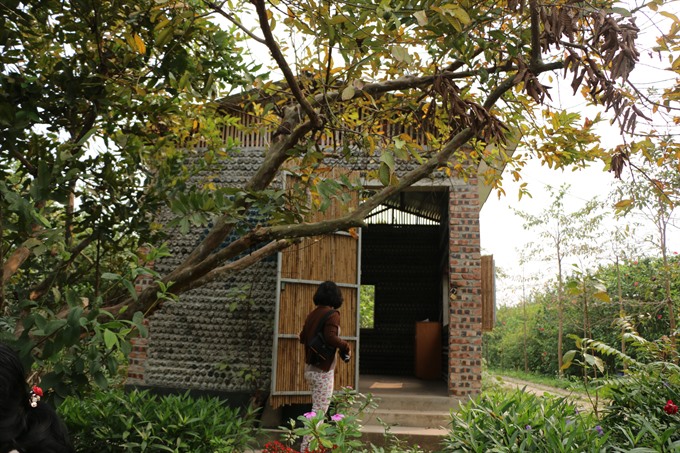 |
| Bottle power: The small library in Tuệ Viên Farm is made from 8,800 discarded plastic bottles filled with sand. VNS Photo Đoàn Tùng |
Several farms on the outskirts of Hà Nội now raise vegetables without chemicals, just as their ancestors did - and city people are flocking to them. Song Hương reports.
It’s a bright morning early on Saturday as five-year-old Daisy follows her mother to explore a farm 15km west of Hà Nội. They wander around, picking up aromatic herbs and inspecting fat, juicy vegetables.
Daisy enjoys picking the grass and catching worms.
“Every weekend, I try to take her somewhere to enjoy sunlight and nature," her mother, Nguyễn Minh Trang, noted later on her Facebook account. “Our destination this weekend is Bfarm, an organic farm which is free from chemicals - and safe for children.”
Daisy and her mum are among dozens of Bfarm members who visit the farm that supplies their daily vegetables whenever they feel like it.
The best season to explore is in winter when it’s not too hot and humid,” said Lê Gia Long, a founder of Bfarm. “Winter is also the season for vegetables such as carrot and kohlrabi as well as aubergine and loofah, all of which the children love picking.”
The farm is one of the first in Hà Nội to raise vegetables, fruit and poultry in a 100 per cent organic way. The intention of the founders was to supply organic vegetable and a safe farm for families to relax at weekends.
The initial farm was soon enlarged from 1,000sq.m in Quốc Oai District on the western outskirts of Hà Nội. The two founders of the farm studied in the United Kingdom. Long’s major was human resources management, while Nguyễn Đức Trung studied banking, monetary systems and finance.
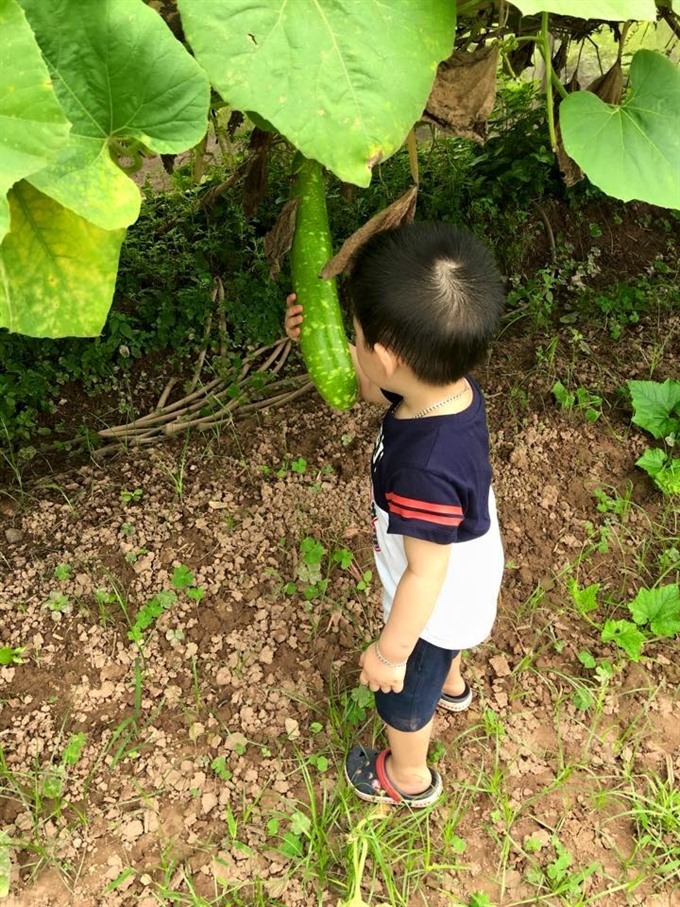 |
| Chemical free: Children are safe at Bfarm as no chemicals are used. Photo courtesy of Bfarm |
Then they got together with Lê Gia Toàn and Trần Quang Đức, who studied business administration and business and finance in the UK.
“We chose to grow organic vegetables as we think that it is a trend for the future and will assist both the human race and the environment," Long said.
They now possess two farms with a total area of of 3.7ha in Quốc Oai District and Thanh Trì District.
To ensure the highest organic standards, the farm uses no chemicals to assist growth or to kill insects and diseases. Grass is often removed by hand and the soil sterilised with lime powder. The soil is then enriched with organic fertilisers, including chicken manure compost, bio-fertiliser Sumagrow, fermented fish and soya bean.
Nets cover the crops to prevent insects and reduce heavy rain. Water for the farm is treated through a purifying system.
Vegetables harvested are transported to Thanh Xuân District before being distributed to customers throughout the city. The process is a complete circle from farm to household doors.
The complicated process requires more labour than normal planting processes and therefore ends up in more expensive vegetables, Long said.
“Our products are also more vulnerable to the weather. We have to often apologise if orders are not met due to the weather. Luckily our members understand and sympathise with us.”
The farm now has about 200 regular members, who order vegetables for daily use - a process that costs them from VNĐ600,000 to 1,800,000 (US$26-80) per month.
“We are now striving to increase the number of members to 300 and then enhance our present services, such as offering organic agriculture tours,” Trung said.
“I think the organic vegetable market has great potential in Việt Nam where there has been so much pollution,” Long said.
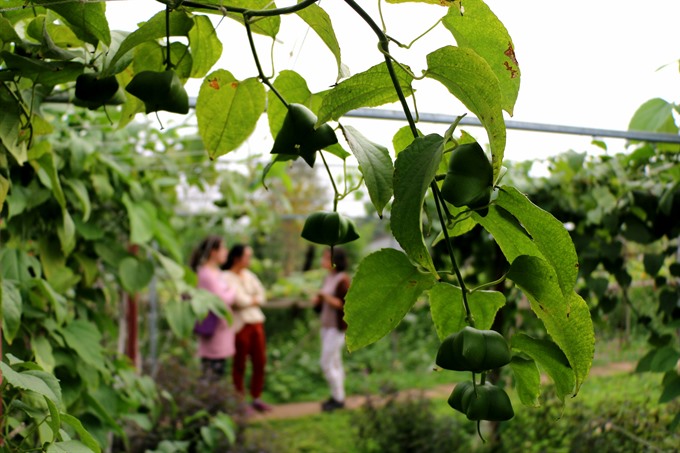 |
| Learning: Visitors to Tuệ Viên Farm learn to grow plants the natural way. VNS Photo Đoàn Tùng |
The farms sometimes attract foreigners who volunteer to do farm work.
“This farm is ideal for me,” said Đào Trọng Hy, a farmer from Hải Phòng, who has worked at Bfarm since the beginning in August, 2015. “Working here make me stronger as I can do my farming job in a safe way, while supplying safe vegetables to other people.”
"Organic vegetables grow more slowly than vegetable using chemical fertilisers and sometimes look less attractive," said Nguyễn Thị Ngân, a farmer from the northern province of Thái Bình. “For example, organic mustard green takes 30 days to grow, five to ten days longer than the normal process using chemicals.”
Hoàng My, a member of Bfarm said she completely trusted the owners and contented with service offered by Bfarm.
“All of our family members eat a lot of vegetables,” My said, “So Bfarm is our choice as we love organic products. We can get seasonal vegetables at affordable prices.”
Nguyễn Mai Phương, an employee at Maritime Bank, said she preferred Bfarm vegetables because they were more tasty.
Another customer, Vũ Thị Hồng Chuyên, said she was persuaded about the quality of Bfarm’s products after visiting the farm.
“All vegetables and fruit we pick can be eaten raw right at the farm,” she said. “I’ll continue to buy Bfarm’s product as the vegetables I raise at home in boxes are not enough for my family.”
Food for thought
Located in the Red River Delta, the Tuệ Viên Organic Farm has become a favourite destination for many families in Hà Nội during weekends. They go to enjoy nature and harvest fresh vegetables.
According to Đỗ Thanh Hường, a resident in Hoàng Mai District, weekend tours to the farm provide her two children with fun and educational benefits.
“My two sons have learned how to plant, nurture and differentiate various kinds of vegetables, which is practical experience that is impossible to gain in the city. They really enjoy gettting involved in nature,” she said.
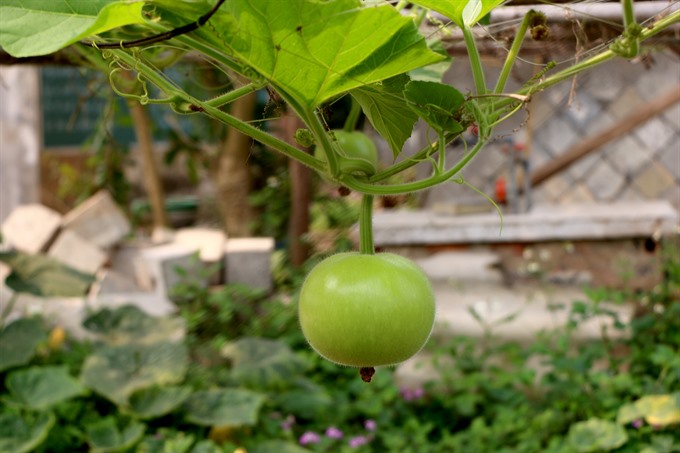 |
| Thriving: Plants grow without stimulants, pesticides or genetically-modified seeds. VNS Photo Đoàn Tùng |
The farm is currently providing a variety of organic vegetables to many supermarkets in Hà Nội, including Vinmart or Fivimart.
Both local and foreign vegetables grow abundantly, from spinach, papaya and betel to Taiwan’s long mulberry and Japan’s sweet leaf.
Organic plants produced on the three-hectare farm use no chemical fertilisers, no pesticides, no stimulants, no herbicides and no genetically-modified seeds.
Nguyễn Thị Phương, manager of the farm, said business was not the main purpose of Tuệ Viên. Every staff member, from the farmers, volunteers to the director, wish to restore the type of farming practised by their ancestors, which means cultivating on soil free of chemicals, fertilising from organic ingredients and offering consumers really healthy vegetables.
“At the same time, we are changing the outlook on farming, which is often looked down on by society,” she said.
According to Phương, the number of visitors to the farm has been increasing over the years. It peaks at weekends when the farm welcomes about 20-30 guests, not to mention groups of students from many primary schools within Hà Nội.
Highlighted activities within the tours, besides planting and harvesting vegetables, include creating biological products from natural ingredients found at the farm.
For example, the visitors learn how to maker mosquito repellent from marigolds and onion, or make organic fertiliser from rotten fruits.
It seems that nothing is wasted in Tuệ Viên farm. All the discarded items, from pieces of wood, bricks, broken glass and even plastic bottles find a second life there. A small library is one of the latest creation of the staff and volunteers there in an effort to recycle such discarded materials.
Constructed in over three months and constituted from 8,800 plastic bottles, the library has become a location for farm staff to take a break and visitors to read books in a tranquil atmosphere of a rural area. — VNS
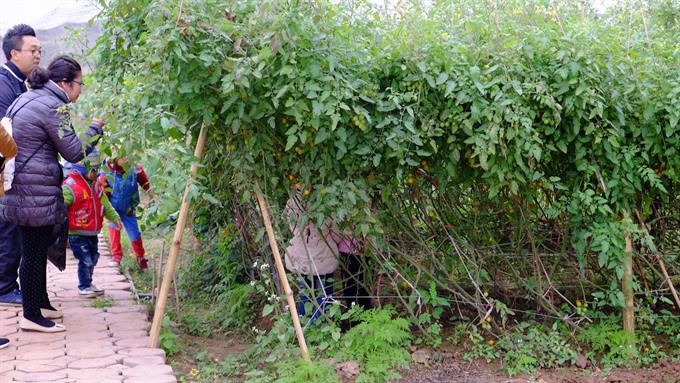 |
| Lost in the crop: Parents and children visit Bfarm every Saturday. Photo courtesy of Bfarm |
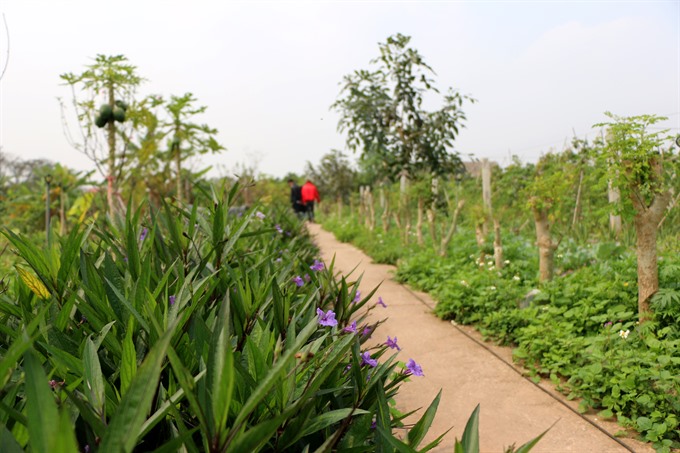 |
| Tranquility: Tuệ Viên Organic Farm offers visitors peace of mind. VNS Photo Đoàn Tùng |